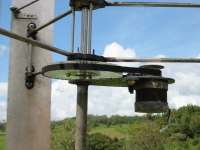| Author |
Message |
MrBungle
Newbie

Joined: 07/10/2005
Location: AustraliaPosts: 34 |
| Posted: 06:28pm 06 Oct 2005 |
 Copy link to clipboard Copy link to clipboard |
 Print this post |
|
Heya Giz,
I also had the same idea about that motor when I saw Oatley advertising them in SC mag, but to be used on VAWT.
I decided against it because of the motors low kv, which wouldn't have suited DD. (that and my lack of tools!)
Do ya reckon a 1:3(for example) belt drive might help this little motor
out of its RPM blues?, kinda like the belt drive you used on your VAWT?

Cheers,
Simo
|
| |
Chris

Senior Member

Joined: 12/09/2005
Location: AustraliaPosts: 146 |
| Posted: 09:03am 07 Oct 2005 |
 Copy link to clipboard Copy link to clipboard |
 Print this post |
|
Yep, i found at about 500 rpm with my oatley motor that it generated
5-6v, in theory with a 1:3 ratio it would increase the voltage by 3
times making it adiquate. However, i have little experiences with
vawts, but from what i have read they are low speed machines with alot
of torque, thus if they are low speed i simply think you would end up
with a similar voltage to what i got.
Try it i guess 
|
| |
MrBungle
Newbie

Joined: 07/10/2005
Location: AustraliaPosts: 34 |
| Posted: 07:20am 11 Oct 2005 |
 Copy link to clipboard Copy link to clipboard |
 Print this post |
|
Hmmmmm
Yeah thats kinda what I figured, with 1:3 ratio = triple your voltage, as voltage is proportional to RPM (kv).
As far as I understand gear/belt systems, the same power in comes out,
minus a few percent for inefficiencies, maybe 5 to 10%(?).
So if:
1x turbine shaft torque * 500 RPM = 500thingamies(!), then
0.333x motor shaft torque * 1500 RPM = 500thingamies too.
Minus a few thingamies for inefficiency.
I think this might just work.
A bonus of this might be that the motor is shifted closer to its peak efficiency range.
Ok, I'ma hava go at this.
BTW, that should read 'high kv' in my previous post.
|
| |
Chris

Senior Member

Joined: 12/09/2005
Location: AustraliaPosts: 146 |
| Posted: 08:01am 11 Oct 2005 |
 Copy link to clipboard Copy link to clipboard |
 Print this post |
|
You gotta remember that to turn a overdrive ratio which is what you
have, it will require more wind, which could potentially mean that you
dont get a higher voltage because it is harder for the wind to turn it.
|
| |
MrBungle
Newbie

Joined: 07/10/2005
Location: AustraliaPosts: 34 |
| Posted: 07:09am 20 Oct 2005 |
 Copy link to clipboard Copy link to clipboard |
 Print this post |
|
I dunno, I would have thought it would be the same load on the VAWT?
Those rough numbers above say it is.
If the RPM of the motor increases three fold, and the torque reduces by a third, then it's the same load?.
The load produced by the motor should be the same with both systems,
since voltage is proportional to RPM and current is proportional to
torque, ie, approx 15v@3.3A = 50W at 500rpm.
Anymore than 3.3A and yes, I'll need more wind.
The voltage may be even slighty higher because of less copper losses and the higher efficiency of the motor.
50W isn't an improvement I know, but its at a more useable voltage.
A bigger VAWT with more torque would produce more current.
The numbers I have crunched(here on paper) certainly look good, but maybe I'm missing something?.
I'm using brushed DC motor theory here, surely DC generators are just the reverse effects, similar properties?
Anyway, hope you dont think I'm being argumentative, I'm just trying to
get a working model in my thick head before I commit too much money to
it.
(unemployed)
I have almost finished a small test VAWT for a little motor I have here.
Its a Darrius/Savonius design, sized to suit the materials I had at hand, but should be enough for the small load.
I just need to make some bearing blocks, then attach the motor direct-drive for some measurements.
Then I need to sort out the gear/belt drive system, which may take a
while due to my lack of machinery, but I'll post results of the DD as
soon as I'm done!
|
| |

